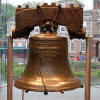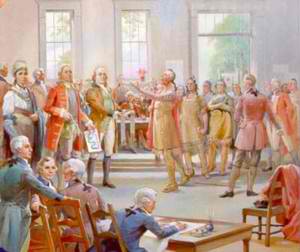
LIBERTY
Liberty and freedom are similar ideas that have strong roots in Native American cultures. Liberty is often defined as the state of being free to do something. Freedom is similar but implies the release from imposed control by a despotic ruler or government. Freedom was not a state of being to do anything we want. There were arguably always restraints, but the governance of restraints are greatly debated to this day. As Thomas Jefferson stated, "...all men are created equal with inalienable rights to life, liberty and the pursuit of happiness...". Freedom was not expressed as a right. Freedom of religion was seen as a release from despotic restraints. Evidence indicates that ideas about liberty came predominately from observations of Native American society and ideals of ancient Greek society. The Greeks wrestled with the concept of government and society, while Native Americans saw government as advisory and a reflection of a holistic mix of creation and appropriate interaction with nature. Europeans observed that Native Americans did not serve rulers and had unprecedented individual liberties. French philosophers, like Montaigne and Rousseau observed visiting Native Americans from Brazil being appalled by the inequities of the poor and adult men of the courts bowing down to a 13 year old king. Jesuit missionaries recorded similar observations of the Huron and stated that they lacked rulers, had no obsession with money, and enjoyed many individual rights.
Many of our founding fathers, including
Thomas Paine (1737-1809), Benjamin Franklin (1706-1790), John Adams (1735-1826)
and Thomas Jefferson (1743-1826), had met at various times with Iroquois and
Delaware (Leni-Lenape) sachems (elected leaders). They inquired about native
society and learned about the confederacies of various tribal groups.
 The
League of the Iroquois (Haudenosaunee) was and is a democratic confederacy of
six nations. It's formation was based on the Great Law of Peace established by
Hiawatha and a council elected by the clan matriarchs that represented the people.
Another body, The Pine Tree Chiefs, were selected for life and acted as wiser
advisors on difficult issues of sovereignty, warfare, trade, and spiritual matters
brought before the council. However, any failure to represent the people could
result in a recall. The checks and balances were of particular interest to our
founding fathers, especially since warriors did not declare war only the
representatives on the council could. These ideas were studied by the founding
fathers and in some cases sachems were invited to Philadelphia. Ben Franklin
used the argument that, ..." It would be a strange thing that Six Nations of
Ignorant Savages should be capable of forming a Scheme for such a Union ... and
yet a like Union should be impracticable for ten or a dozen English colonies...".
Franklin was trying some reverse psychology with the use of "ignorant savages".
The Union idea was part of negotiations for the Albany Congress of 1754.
The
League of the Iroquois (Haudenosaunee) was and is a democratic confederacy of
six nations. It's formation was based on the Great Law of Peace established by
Hiawatha and a council elected by the clan matriarchs that represented the people.
Another body, The Pine Tree Chiefs, were selected for life and acted as wiser
advisors on difficult issues of sovereignty, warfare, trade, and spiritual matters
brought before the council. However, any failure to represent the people could
result in a recall. The checks and balances were of particular interest to our
founding fathers, especially since warriors did not declare war only the
representatives on the council could. These ideas were studied by the founding
fathers and in some cases sachems were invited to Philadelphia. Ben Franklin
used the argument that, ..." It would be a strange thing that Six Nations of
Ignorant Savages should be capable of forming a Scheme for such a Union ... and
yet a like Union should be impracticable for ten or a dozen English colonies...".
Franklin was trying some reverse psychology with the use of "ignorant savages".
The Union idea was part of negotiations for the Albany Congress of 1754.
Unfortunately, much of this history of Native American influences on the United States and the rest of the Americas are not included in history texts. Jefferson and Adams traveled extensively to England and France, yet their interaction with philosophers ignores the Native American influences on both. Europe had an oppressive system of despotic rulers, church authority, trade monopolies, and a rigid class system that made individual liberties unknown. Once European immigrants settled in foreign places they became aware of what individual liberties they were missing.